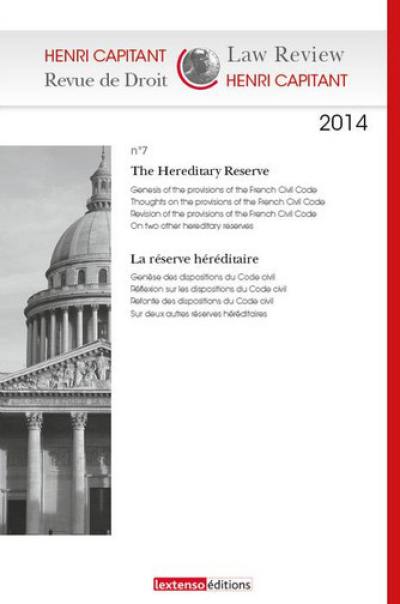
Fiche technique
Format : Broché
Nb de pages : 204 pages
Poids : 346 g
Dimensions : 16cm X 24cm
ISBN : 978-2-35971-155-4
EAN : 9782359711554
The hereditary reserve
Quatrième de couverture
n° | 2014 The Hereditary Reserve
The Henri Capitant Association of friends of French legal culture, which this year celebrates its 75 years in existence, has developed various actions which all aim at the development of the methods and values of continental or civil legal culture.
The Association organises several Congresses. To start with, the International Meetings, which have taken place since the founding of the Association, have led to regular publications amounting presently to more than 60 volumes. These Meetings, which take place every year and concentrate on a topic related to different branches of law (private or public law, national and international law), bring together specialists of law from more than 30 countries from all over Europe, America, Africa and Asia. In recent years, the Henri Capitant Association has also organised International Sessions on a smaller scale where two or more groups exchange points of view on current issues.
The Henri Capitant Association has concentrated on French Civil Law Reform which was initiated at the beginning of the twenty first century. In the same way, the Association has actively participated in the european group in charge of the Common Frame of Reference in order to build a new contractual European law.
With the creation of the Revue de Droit Henri Capitant or Henri Capitant Law Review, the Association is embarking upon a new adventure. The undertaking is ambitious because this Review will be drafted in two languages - in French and in English - and will be the object of a dual publication, in digital format and in hard copy. But it is up to the challenge, which seems vital to meet : ensuring a better knowledge of the law of civil law countries, of their legislation, of their case-law and of their doctrines, by supporting their dissemination throughout the world. In order to succeed in this undertaking, it would not be possible, in fact, to disregard either the English language or the digital media, which have become means of communication that are unavoidable. And although it is true that translation carries a risk of betrayal, and particularly so with regards to legal subject-matter, it is nonetheless a risk well worth taking. After all, certain civil law jurisdictions, such as Québec, state their laws in several languages.
Each issue of the Review, which will be published every six months, will address a single theme, selected for its interest from the standpoint of comparative law, and will bring together laws, judicial decisions and studies of yesteryear, as well as of today. All suggestions, wherever they may come from, will be welcomed.





